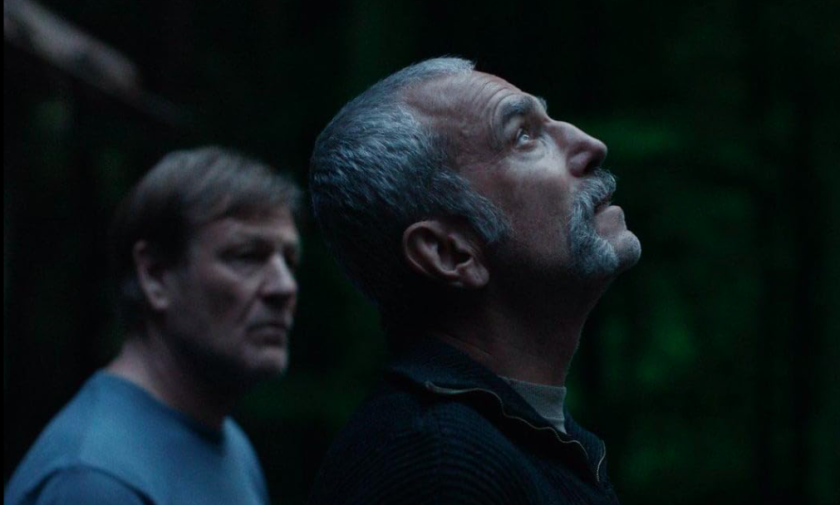Given that the film industry is a fairly vain business, it follows that every movie is to some extent a vanity project. So it seems churlish to describe this new Daniel Day-Lewis picture, which he co-wrote with his son, Ronan, for Ronan to direct and himself to star in, as other than a welcome return for the superman actor.
It’s eight years since Day-Lewis père was last seen on the screen (in Phantom Thread), or frankly seen anywhere else, and here the celebrated recluse plays an inland Robinson Crusoe coming to terms with the sins of the past. The film appears to be set about 20 years ago, and tracks the journey of 60-something Jem (Sean Bean) to a stone cabin in a remote north-of-Britain forest where lurks his brother, Ray (Daniel Day-Lewis), holed up here for decades with the shipping forecast, Black Sabbath music and various sharp implements for company.
The two square up to each other in silent blokeyness at first, as if at an Iron John retreat, before childhood and grown-up skeletons tumble out of the cupboard. The movie is largely a character study, staring down the wreckage of past personal atrocities, with the moodiness cranked up high but never quite to the level of searing. Will Jem be able to winkle Ray out of this fastness and return to the civilised world that we take to be a good thing?
Ray’s baggage would defeat the beefiest hotel porter: an abandoned wife, an abandoned son, a care-home heritage of being abused by a priest, and the guilt of an army killing during “the early Troubles in Northern Ireland” (i.e. the 1970s). Brother Jem, by the way, took the opportunity of Ray’s absence to take up with his wife. We cut away from the woods to see wife Nessa (Samantha Morton) struggling back at home with the son, Brian (Samuel Bottomley), now nearly an adult and sliding into the same imploded pique as his biological dad.
To focus next, as we should, on Day-Lewis’s central contribution: in this assured debut feature, Ronan Day-Lewis offers us a rich, wet, leafy bleakness, the visuals punched in tight without being overbearing. An ornate, thunderous soundscape includes every variety of wind, rain and rustling foliage (sound designer: Steve Fanagan) merged with an oceanic electro-orchestral score by Bobby Krlic.
The narrative has little forward movement – the whole thing is an exercise in backstory revelation – but as with many static and ostensibly “boring” films, there’s often something interesting about being boring, as we’ve seen going back to at least the films of Andrei Tarkovsky.
To pep things up, the director adds weird imagery in the style of Jonathan Glazer, including a ghostly floating woman and a glowing alien horse-creature in a lake. These sensory abstractions sit a little awkwardly alongside the social realism of the basic text, which at times resembles a one-act play at the Royal Court. But there’s also an astonishing, extra-terrestrial hail storm that chimes with the immersive, battering and cleansing tone of the film as a whole.
Four principal actors offer excellent rooted performances, as required in a very observational piece. The always surprising Morton exudes toughness and grace as Tessa, fighting her own kind of hollowness, and Bottomley as Brian conveys the roiling of a young man overburdened by a past and future that his father is trying to dodge.
Sean Bean as Jem has a familiar watchfulness and brooding, and a face creasing up like a paper bag. He also has his patented Sheffield accent which Daniel Day-Lewis, as befits his brother, matches to a tee, down to its slightly tenor-ish overtones. It’s almost as though the film was built originally around Bean and his voice rather than around Day-Lewis.
The greying star himself, equipped with a fairly kempt Sean Connery handlebar moustache, moves from sly menace and Olympic bloody-mindedness towards a reckoning with what he calls “the exquisite agony of self-denial”. Behind candescent eyes that are feral, calculating and deeply afraid, he keeps us guessing about what kindness there might be within his spinning-beachball brain.
Rarely do these GOAT-level actors specialise in vacancy, and after the laconic, Beckett-like beginning, the film offers Day-Lewis plenty of dialogue to toss and turn and time to perfection – rather too much of it, in fact. A bit like Robinson Crusoe, who re-connected with the English-speaking world after a similar length of time, he’s surprisingly chatty. His staring at water, listening to the wind or running in silence along a shoreline are equally good at showing him address life and its impossible boundaries. For Anemone is more than anything a therapy movie. But, then again, aren’t they all?















Add comment